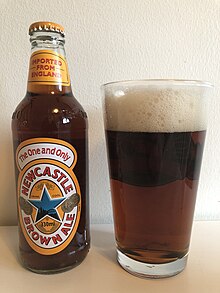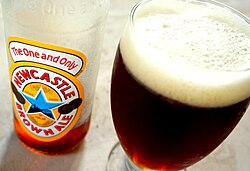
Foster's Lager is an internationally distributed brand of Australian lager. It is owned by the Japanese brewing group Asahi Group Holdings, and is brewed under licence in a number of countries, including its biggest market, the UK, where the European rights to the brand are owned by Heineken International.
Adnams is a regional brewery founded in 1872 in Southwold, Suffolk, England, by George and Ernest Adnams. It produces cask ale and bottled beers. Annual production is around 85,000 barrels.

Heineken N.V. is a Dutch multinational brewing company, founded in 1864 by Gerard Adriaan Heineken in Amsterdam. As of 2019, Heineken owns over 165 breweries in more than 70 countries. It produces 348 international, regional, local and speciality beers and ciders and employs approximately 85,000 people.

John Smith's Brewery in Tadcaster, North Yorkshire, England, produces beers including John Smith's, the highest selling bitter in the United Kingdom since the mid-1990s.
Scottish & Newcastle plc was a brewing company headquartered in Edinburgh, Scotland, which expanded from its home base to become an international business with beer volumes growing almost tenfold.
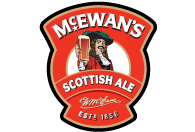
McEwan's is a brand of beer owned by Carlsberg Marston's Brewing Company. It was originally brewed by William McEwan's Fountain Brewery in Edinburgh, Scotland. The McEwan's brand passed to Heineken in 2008 after their purchase of Scottish & Newcastle's British operations. Heineken sold the brand to Wells & Young's in 2011, who sold their brewing operation, including the McEwan brand to Marston's in 2017. Cans and bottles are now brewed in Bedford, England.
Webster's Brewery was a brewery founded in 1838 by Samuel Webster which operated at the Fountain Head Brewery in Halifax, West Yorkshire, England. Webster's Green Label, a light mild, and Yorkshire Bitter gained national distribution after the company was taken over by Watney Mann in 1972. Throughout the 1970s it was known for the advertising slogan: "Drives out the northern thirst".

Beer has been brewed in England for thousands of years. As a beer brewing country, it is known for top fermented cask beer which finishes maturing in the cellar of the pub rather than at the brewery and is served with only natural carbonation.

Caledonian Brewery was a Scottish brewery founded in 1869 in the Shandon area of Edinburgh, Scotland.
Beer in Africa, especially lager, is produced commercially in most African countries, and indigenous people also make varieties of beer. Beer is served in various locales, from neighbourhood shebeens to upscale bars. Many countries have standardized beer bottle sizes, which are cleaned and re-used, so when buying beer at a store, people often must pay a deposit on the bottle and the price of the beer. An alternative to glass-bottle beers is local beer sold in tetra-pak style paper cartons.

The Lagunitas Brewing Company, founded in 1993 in Petaluma, California, is a subsidiary of Heineken International. Before Heineken bought a 50% share of the company in 2015, the company met the definition of a craft brewery. Two years prior it ranked fifth top-selling craft brewery in the US. Heineken purchased the remainder of the company in 2017.
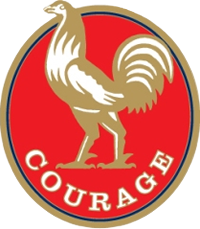
Courage Brewery was an English brewery, founded by John Courage in 1787 in London, England.
Heineken N.V. is a Dutch brewer which owns a worldwide portfolio of over 170 beer brands, mainly pale lager, though some other beer styles are produced. The two largest brands are Heineken and Tecate; though the portfolio includes Amstel, Fosters, Sagres, Cruzcampo, Skopsko, Affligem, Żywiec, Starobrno, Zagorka, Zlatý Bažant, Laško and Birra Moretti.

Younger's Brewery was a brewery in Edinburgh. Established in 1749, it became one of the city’s main commercial enterprises, supplying domestic and foreign markets.

Beer is often made from barley malt, water, hops and yeast and so is often suitable for vegans and vegetarians. Some beer brewers add finings to clarify the beer when racking into a barrel. Finings can include plant-derived products, like Irish moss, or animal-derived products, like isinglass and gelatin.
Coors Brewers Limited, later known as Molson Coors Brewing Company (UK) Limited, is the UK arm of Molson Coors Beverage Company. Its headquarters is in Burton upon Trent, Staffordshire. The company originates from Bass Brewers Limited. The company has gone through many name changes and mergers.

Wells & Young's Brewery was formed in 2006 from a merger of the brewing operations of Charles Wells Ltd and Young's Brewery. Charles Wells initially had a 60% stake and Young's 40%. In 2011, Charles Wells took full control when it bought Young's 40% stake. Wells & Young's is now responsible for brewing, distributing and marketing Charles Wells' and Young & Co's brands at the Eagle Brewery in Bedford.

Camerons Brewery is an English brewery established by John William Cameron in Stranton, Hartlepool, County Durham, in 1865. It is the largest independent brewer in the North East of England, with a brewery capacity of 1.5 million hectolitres and a tied estate of 75 houses. It is one of the oldest industrial concerns in Hartlepool, and has historically been one of the largest employers.

Beer in Scotland is mostly produced by breweries in the central Lowlands, which also contain the main centres of population. Edinburgh and Alloa in particular became noted for the export of beer around the world in the 19th century.
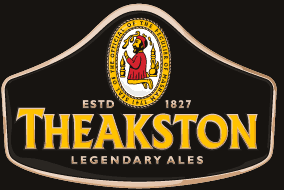
T&R Theakston is a brewery in the market town of Masham, North Yorkshire, England. The company is the sixteenth largest brewer in the UK by market share, and the second largest brewer under family ownership after Shepherd Neame. Its best known beer is Old Peculier.
